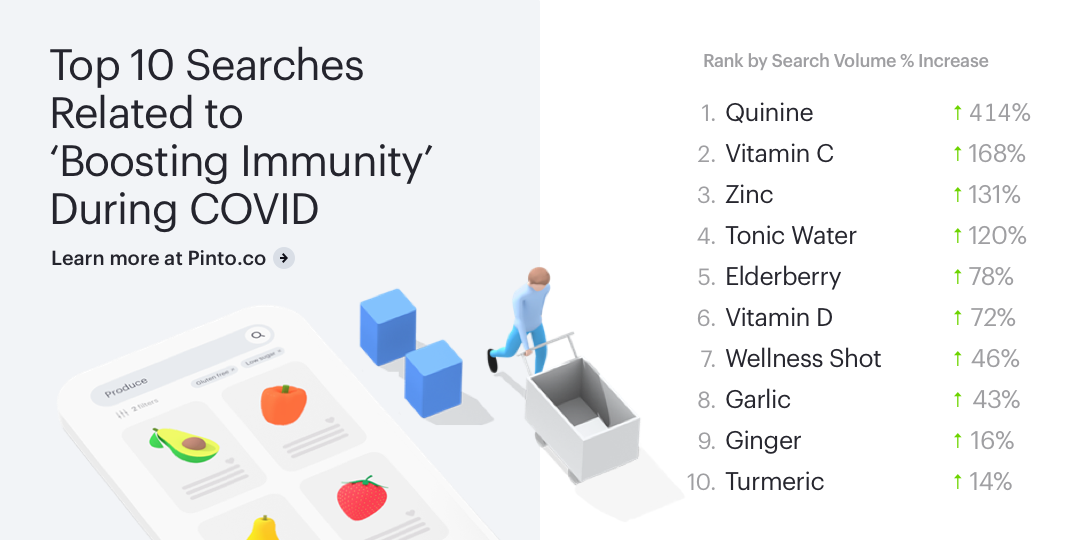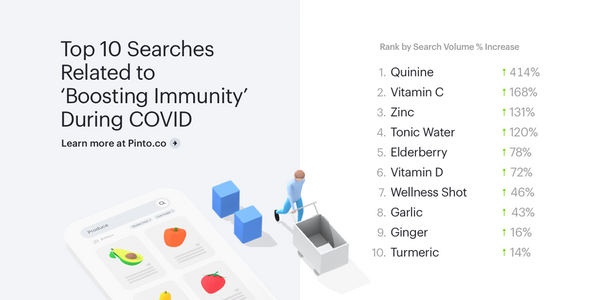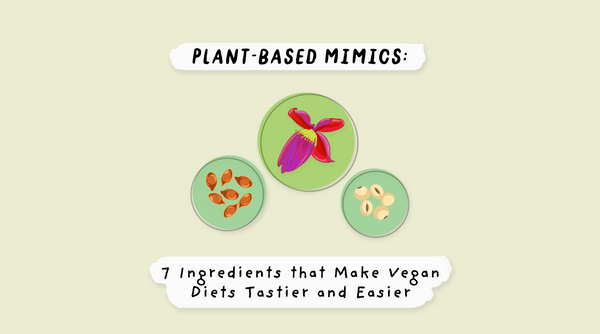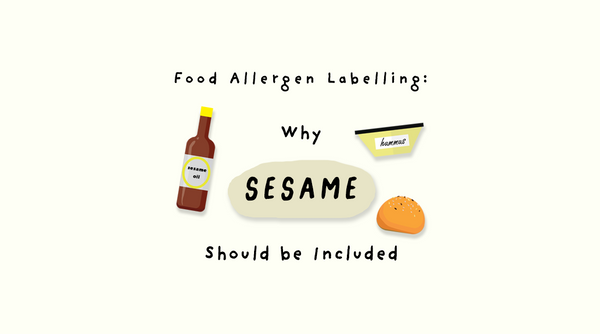A brief look
- From February to July – during the heights of the COVID pandemic – we saw a significant uptick in searches related to boosting immune health.
- Though not typically associated with immune health, search terms like quinine and tonic water made it into the top half of the list due to a specific viral video.
- Terms related to immunity and traditional cold remedies – such as vitamin C and elderberries – as well as various spices and herbs, also saw a rise among consumer search terms.
Dive deeper
The first case of coronavirus (COVID-19) was reported in China in late November 2019, and a few months later it had swept across the entire world. In the U.S., coronavirus fears reached a fever pitch in March when the World Health Organization officially classified COVID-19 as a pandemic. States began implementing lockdown measures and the stock market continued to plunge further and further. As the number of positive cases within the country continued to rise, many turned to the internet to find ways to boost their immunity in hopes that it could help them avoid getting infected. In this article, we round up the top 10 searches related to “immunity boosting” and offer a few theories about why these terms suddenly became popular.

Why quinine, zinc, and tonic water were trending
Quinine, zinc, and tonic water came in at first, third, and fourth on the list, respectively. Why? Well, in a viral Facebook video published in May, a chiropractor claimed that taking zinc tablets along with tonic water could “knock out” COVID-19. Zinc does help in regulating the immune system and one study has shown that zinc insufficiency may be considered a risk factor for infectious diseases. But why tonic water? In the video, the chiropractor explained that tonic water contains quinine and claimed that this may offer some sort of additional benefit in fighting the virus.
The compound quinine is derived from the bark of the cinchona tree and is what gives tonic water its bitter taste. Quinine is also used in treating malaria and if you’ve been following the news for the past few months, perhaps you already know the name of a popular anti-malarial drug: hydroxychloroquine.
Though primarily an anti-malarial drug, hydroxychloroquine was investigated as a possible treatment for COVID-19 patients. Numerous studies have since shown that the drug is not effective in the treatment of COVID-19.
In essence, hydroxychloroquine is the synthetic form of quinine and was developed based on the structure of the compound. Thus, maybe the chiropractor had concluded that since hydroxychloroquine is made out of quinine and that tonic water contains quinine, it would somehow help in the treatment of COVID-19. Of course, this assumption is in itself flawed because there is not nearly enough quinine in tonic water to rival that of a synthetic drug. Needless to say, the viral video has since been taken down, but that did not stop thousands of people from looking up quinine, tonic water, and zinc.
Vitamin C, D, and elderberry can be promising
Vitamin C sits in second place on the list and that shouldn’t surprise anyone. For years, taking vitamin C has been synonymous with improving one’s immune health. Unfortunately, a review of research has shown that vitamin C offers no meaningful benefit for the average person when it comes to preventing or treating the flu, and there’s no research yet on its effectiveness for COVID-19. Nonetheless, foods that are rich in vitamin C are generally very good for your overall health. By all means, don’t be shy about eating broccoli, brussels sprouts, papayas, mangos, and oranges.
A less common fruit has also piqued the public’s interest during the pandemic. Elderberry is in fifth place on the list with a 78% increase in search volume. The fruit is often touted for its high vitamin C and antioxidant content. The plant itself has also been known for its medicinal properties since at least 400 BCE when Hippocrates—the father of medicine—referred to it as his “medicine chest.” The plant was used for a variety of things, including improving general health and treating burns. The bark was even used as a laxative. More recently, it has gained attention for its potential in preventing and treating the flu.
In a study at the University of Sydney, researchers found that the anthocyanins—the compounds that give the fruit its purple color—in elderberry juice were effective at stopping the entry and replication of a virus in cells. Although promising, this was a test-tube study and further research needs to be conducted to corroborate the results. Commercially, elderberry is sold as either a syrup or in tablet form, and during the height of the pandemic, many went searching for these remedies.
A healthy dose of sunshine can brighten your day and give your body a little boost of vitamin D. The sunshine vitamin comes in sixth place on our list. In May, social media was flooded with news of a recently released study that suggested that vitamin D could potentially suppress cytokine storms (an immune response where the immune system begins to attack one’s own body) which often occurs in patients that have contracted COVID-19. This overreaction of the immune system can lead to tissue damage and infection in the lungs, even among young and otherwise healthy patients. Further research is needed to see if the initial excitement about vitamin D was warranted.
A wellness shot may be a healthy indulgence
Wellness shots are a concoction of juices, herbs, and spices that are meant to give the immune system a healthy jolt. With a 46% increase in search volume, wellness shots came in seventh place on our list. They range from mixtures like honey, ginger, and turmeric to something as simple as a shot of wheatgrass juice. Three common ingredients in these wellness shots—garlic, ginger, and turmeric—round out the last three spots on the list.
In traditional medicine across many different cultures, these three foods are often used in teas, soups, and other beverages to help prevent and treat colds and other common ailments. The compounds found in these herbs, such as allicin, curcuminoids, and those found in ginger oil, have been shown to be able to control the activation of cells that are responsible for fighting against diseases and also confer anti-inflammatory properties. Most research in the area focuses on the use of these compounds to be used in therapy for immune disorders such as rheumatoid arthritis and less so against the common cold. A review of research on whether these herbs are effective against the flu has shown inconclusive results, but they probably won’t save you from COVID-19.
Though the end of the pandemic doesn’t seem to be in sight as of yet, the frantic searches for a quick cure seem to have died down. Most are now accepting mask wearing and social distancing as the new normal until a viable vaccine is approved. The constant barrage of both useful and dubious information from social media and traditional media often leaves people searching for answers on the Google machine. Unfortunately, it’s not perfect either, so we all have to be vigilant about finding authoritative sources and reliable experts.

Search volume increase was calculated by comparing the search volume from [February 2020 to July 2020] versus six months prior [August 2019 to January 2020].





